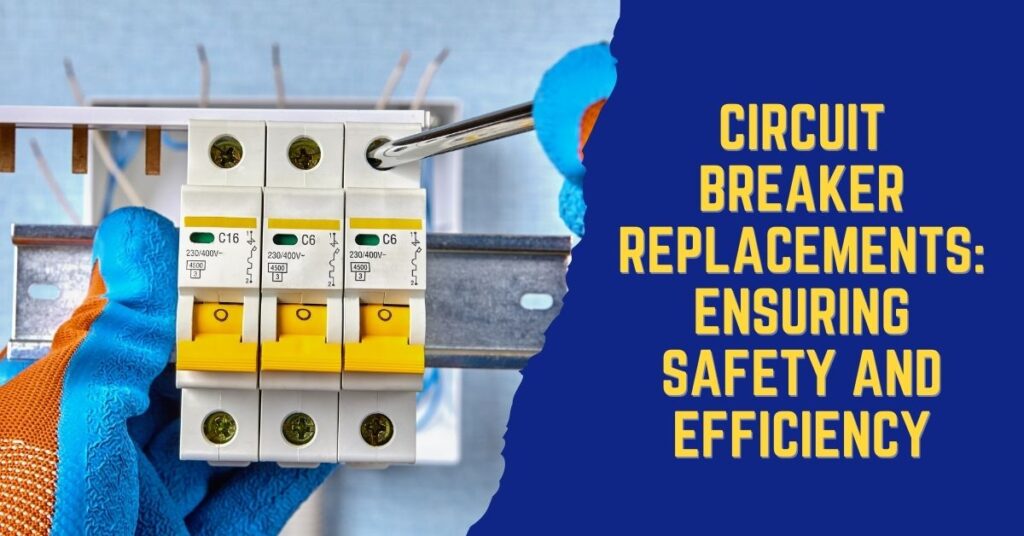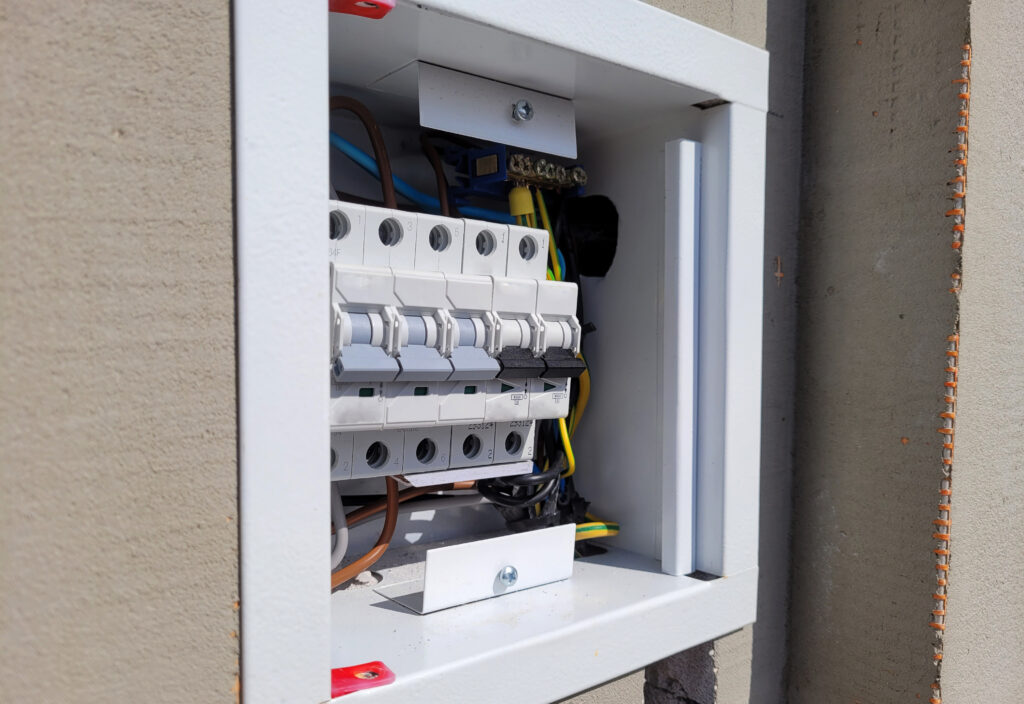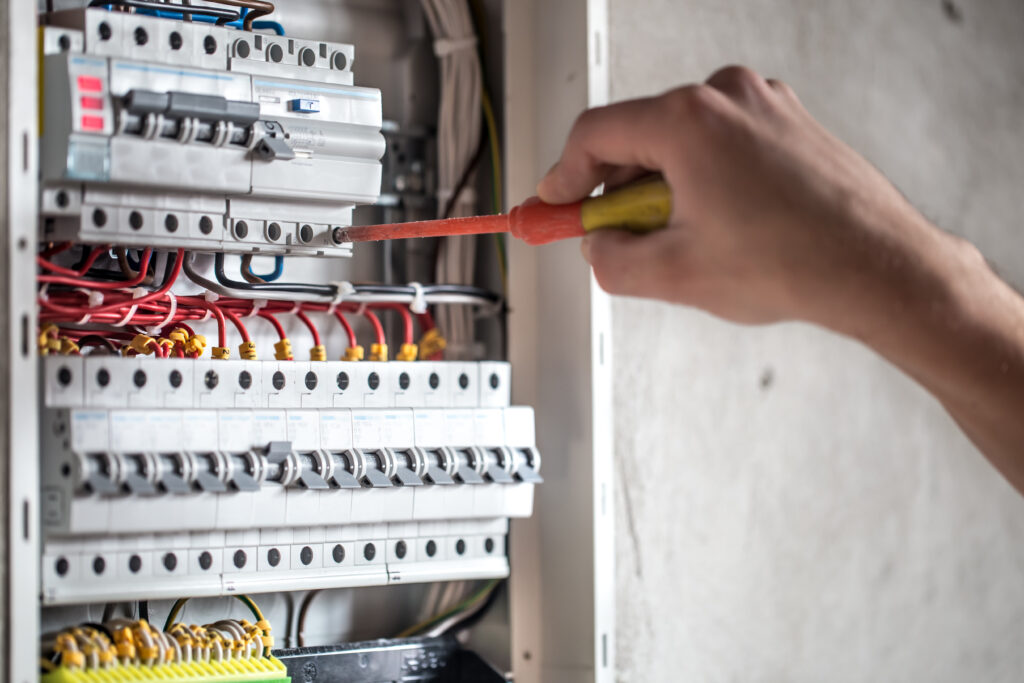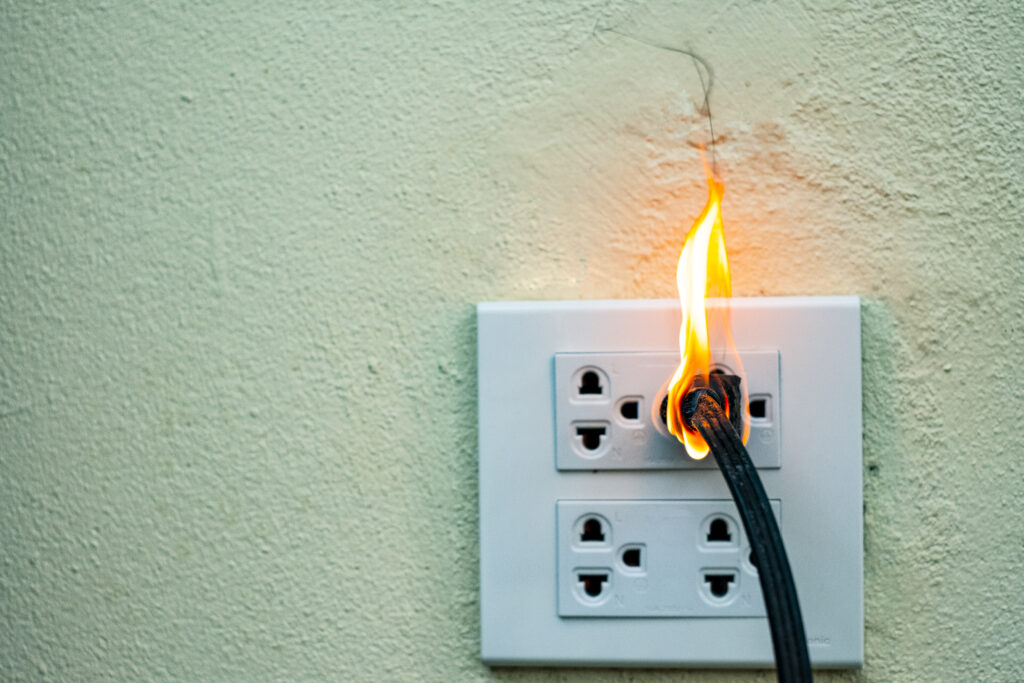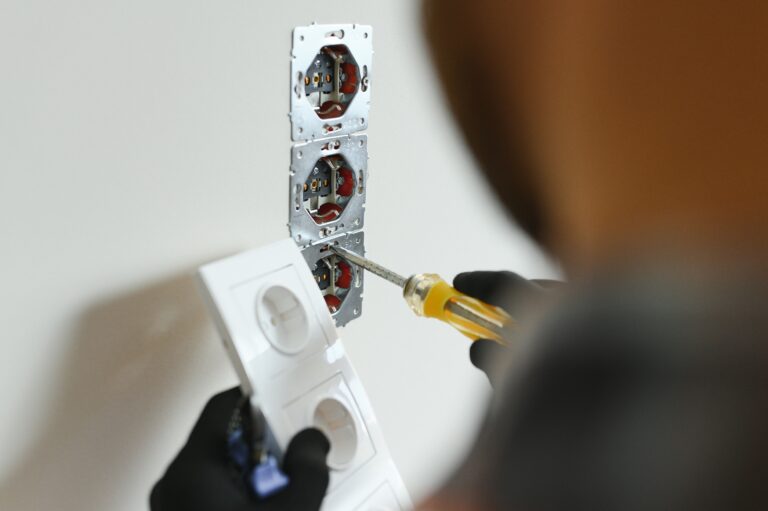Are you facing electrical issues in your Boca Raton home or business? Look no further! At Boca Electrical Services, Inc., we specialize in expert circuit breaker replacements to ensure your safety and peace of mind. As trusted electricians with decades of experience, we understand the importance of maintaining a reliable electrical system. In this comprehensive guide, we’ll delve into everything you need to know about circuit breaker replacements, from recognizing warning signs to understanding the replacement process and cost factors. Whether you’re experiencing tripped circuits or flickering lights, we’ve got you covered. Let’s dive in and shed light on this vital aspect of electrical maintenance.
Understanding Circuit Breakers
Circuit breakers are the unsung heroes of your electrical system, silently standing guard to protect your home or business from potential hazards. These crucial devices serve as the first line of defense against electrical overloads, short circuits, and other faults that could lead to fires or damage to your property. Understanding how circuit breakers work and their role in maintaining electrical safety is essential for every homeowner and business owner.
- Circuit breakers act as automatic switches that interrupt electrical flow when they detect abnormal conditions.
- They come in various types, including standard, GFCI (Ground Fault Circuit Interrupter), AFCI (Arc Fault Circuit Interrupter), and combination breakers, each designed to provide specific protection.
- Regular inspection and maintenance of circuit breakers are essential to ensure they function correctly when needed most.
Components of a Circuit Breaker
Understanding the components of a circuit breaker is fundamental to grasping how they operate. Here’s a breakdown of the key elements:
- Circuit breaker contacts:These are the points where the electrical current flows through when the circuit is closed. When a fault occurs, these contacts open to interrupt the flow of electricity.
- Trip mechanism:This mechanism detects abnormal conditions such as overloads or short circuits and triggers the circuit breaker to open.
- Arc extinguisher:In the event of an arc fault, this component extinguishes the electrical arc to prevent fire hazards.
- Operating handle: This allows manual operation of the circuit breaker, enabling users to manually open or close the circuit when necessary.
Types of Circuit Breakers
Circuit breakers come in various types, each designed for specific applications and levels of protection. Understanding the differences between these types is crucial for selecting the right one for your needs:
- Standard circuit breakers:These are the most common type of circuit breakers and provide basic protection against overloads and short circuits.
- GFCI (Ground Fault Circuit Interrupter) breakers:Designed to protect against ground faults, these breakers quickly shut off power to prevent electric shocks.
- AFCI (Arc Fault Circuit Interrupter) breakers: These breakers detect dangerous arcing faults and disconnect power to prevent electrical fires.
- Combination breakers: Offering both GFCI and AFCI protection in a single device, these breakers provide comprehensive safety coverage.
Signs Your Circuit Breaker Needs Replacement
Being proactive in identifying signs of a failing circuit breaker is crucial for preemptive maintenance. Recognizing these signs early can help prevent potential electrical hazards and costly damage to your property. Here are some common indicators that your circuit breaker may need replacement:
- Circuit breaker tripping frequently:If your circuit breaker trips frequently, it could indicate an overloaded circuit or a faulty breaker.
- Indications of electrical issues:Keep an eye out for signs of electrical issues such as sparks, smoke, or unusual sounds coming from the breaker panel.
- Persistent circuit breaker won’t reset:If a circuit breaker refuses to reset or keeps tripping after being reset, it may be nearing the end of its lifespan.
- Unresponsive circuit breaker:A circuit breaker that fails to trip when it should or doesn’t respond to manual operation signals potential internal damage.
- Burning smell from the panel: A pungent burning odor emanating from the electrical panel could indicate overheating or electrical arcing, necessitating immediate attention.
- Flickering lights:Flickering or dimming lights, especially when using certain appliances, may indicate voltage fluctuations caused by a faulty breaker.
Common Signs of a Failing Circuit Breaker
Signs like an unresponsive circuit breaker, a pungent smell emanating from the electrical panel, or flickering lights warrant immediate attention. These warning signs often indicate underlying issues with the circuit breaker that require prompt resolution to ensure the safety and functionality of your electrical system.
- Circuit breaker won’t reset:If your circuit breaker refuses to reset after tripping or repeatedly trips shortly after being reset, it may be failing and in need of replacement.
- Burning smell from the panel:A strong burning odor coming from the electrical panel suggests overheating or electrical arcing, both of which pose significant fire hazards.
- Flickering lights:Lights that flicker or dim unexpectedly, especially when using specific appliances, can indicate voltage fluctuations caused by a faulty circuit breaker.
- Unresponsive circuit breaker:A circuit breaker that fails to trip when overloaded or doesn’t respond to manual operation signals potential internal damage or wear.
Prompt action is essential when encountering any of these signs to prevent potential electrical hazards and ensure the continued safety and efficiency of your electrical system.
Importance of Timely Circuit Breaker Replacements
Timely replacements serve as a bulwark against potential electrical hazards and ensure uninterrupted operation. As the cornerstone of electrical safety, circuit breakers play a pivotal role in safeguarding your home or business against various risks. Here’s why timely circuit breaker replacements are essential:
- Electrical hazards mitigation:Outdated or malfunctioning circuit breakers increase the risk of electrical hazards such as fires, shocks, and equipment damage. Timely replacements mitigate these risks, protecting both property and lives.
- Preventative maintenance:Proactively replacing circuit breakers before they fail is a form of preventative maintenance that can save you from costly repairs and downtime in the long run. It allows you to address potential issues before they escalate into emergencies.
- Electrical efficiency optimization:Newer circuit breakers are often more efficient and reliable than older models, leading to improved electrical system performance and energy savings. By replacing outdated breakers, you can optimize the efficiency of your electrical infrastructure.
Investing in timely replacements demonstrates a commitment to safety, reliability, and efficiency, ensuring that your electrical system remains robust and resilient against unforeseen challenges.
Circuit Breaker Replacement Process
Our seasoned electricians meticulously follow a structured process to execute circuit breaker replacements seamlessly. With years of experience and expertise, our skilled technicians ensure that every replacement is conducted with the utmost care and precision, adhering to strict safety protocols throughout the procedure.
- Replacement procedures:Our technicians are trained to efficiently carry out circuit breaker replacements, minimizing disruption to your electrical system and ensuring a smooth transition to the new breaker.
- Skilled technicians:Our team comprises highly trained and certified electricians who possess the knowledge and proficiency required to handle complex electrical tasks with confidence and precision.
- Safety protocols adherence:Safety is our top priority. We strictly adhere to industry-standard safety protocols and procedures to protect both our technicians and your property during the replacement process.
Rest assured that when you entrust us with your circuit breaker replacement needs, you’re in capable hands. Our commitment to excellence ensures that your electrical system receives the care and attention it deserves.
Step-by-Step Guide to Circuit Breaker Replacement
Replacing a circuit breaker requires meticulous attention to detail and adherence to specific procedures to ensure a successful outcome. Here’s a step-by-step guide to the circuit breaker replacement process:
- Power supply disconnection: The first step is to shut off the power supply to the circuit breaker panel to prevent the risk of electrical shock or injury.
- Old breaker removal:Our technicians carefully remove the old circuit breaker from the panel, taking care to disconnect it from the electrical wiring without causing damage.
- New breaker installation:Once the old breaker is removed, our technicians install the new circuit breaker in its place, ensuring a secure and proper connection to the electrical wiring.
- Testing and verification:After installation, our technicians thoroughly test the new circuit breaker to ensure it functions correctly and provides the necessary protection against electrical faults.
- Final inspection: Before concluding the replacement process, our technicians conduct a final inspection to verify that everything is in order and meets our rigorous quality standards.
By following these steps diligently, our technicians ensure that your circuit breaker replacement is completed safely, efficiently, and with minimal disruption to your electrical service.
Cost of Circuit Breaker Replacements
Understanding the cost dynamics associated with circuit breaker replacements facilitates effective budget planning. Whether you’re a homeowner or a business owner, knowing what to expect in terms of costs can help you make informed decisions and avoid unexpected expenses. Here’s a closer look at the factors that influence the cost of circuit breaker replacements:
- Replacement cost estimation:The cost of circuit breaker replacements can vary depending on factors such as the type and size of the breaker, the complexity of the installation, and any additional services required.
- Financial planning for electrical services:Budgeting for circuit breaker replacements should include not only the cost of the replacement itself but also any associated fees, such as labor charges and materials.
- Cost determinants:Several factors can impact the overall cost of a circuit breaker replacement, including the brand and quality of the breaker, the accessibility of the installation site, and any necessary upgrades or modifications to the electrical system.
By understanding these cost determinants and factors, you can make more informed decisions when planning for circuit breaker replacements and ensure that your electrical system remains safe, reliable, and up-to-date.
FAQs about Circuit Breaker Replacements
Let’s address some common inquiries that can help you understand the importance and necessity of this crucial aspect of electrical maintenance.
How frequently should I replace my circuit breaker?
Circuit breakers typically have a lifespan of around 20 to 30 years. However, factors such as usage, environmental conditions, and the quality of the breaker can impact its longevity. It’s advisable to have a professional electrician inspect your circuit breaker every 10 years to assess its condition and determine if replacement is necessary.
Is it advisable to perform a DIY circuit breaker replacement, or should I enlist professional assistance?
While some minor electrical tasks can be DIY projects, replacing a circuit breaker is best left to trained professionals. Electrical work can be dangerous and requires specialized knowledge to ensure it’s done safely and correctly. Enlisting the help of a professional electrician not only ensures your safety but also guarantees compliance with local building codes and regulations.
What is the typical lifespan of a circuit breaker?
The typical lifespan of a circuit breaker is approximately 20 to 30 years. However, this can vary depending on factors such as usage, environmental conditions, and the quality of the breaker. Regular maintenance and inspections can help extend the lifespan of your circuit breaker and ensure it continues to function efficiently.
What are the telltale signs necessitating a circuit breaker replacement?
There are several signs that may indicate your circuit breaker needs replacement, including frequent tripping, unresponsive behavior, burning odors, or visible damage. If you notice any of these signs, it’s essential to have a professional electrician inspect your electrical system to determine the best course of action.
Can upgrading my circuit breaker enhance electrical efficiency?
Yes, upgrading your circuit breaker to a newer, more efficient model can enhance electrical efficiency and safety. Modern circuit breakers are designed to provide better protection against electrical faults and may offer features such as overload protection and arc fault detection. Additionally, upgrading to a higher capacity breaker can accommodate increased electrical demands, reducing the risk of overloads and tripping.
Key Takeaway
Ensuring the safety and efficiency of your electrical system through timely circuit breaker replacements is paramount. From understanding the role of circuit breakers and recognizing signs necessitating replacement to comprehending the replacement process and cost considerations, our comprehensive guide equips you with the knowledge needed to make informed decisions. By entrusting Boca Electrical Services, Inc., you gain access to expert technicians who prioritize safety, precision, and reliability in every replacement. Stay proactive, prioritize maintenance, and trust in our commitment to providing superior service, safeguarding your home or business for years to come.
Schedule Your Circuit Breaker Replacement Today!
Don’t wait until it’s too late. Ensure the safety and efficiency of your electrical system by scheduling your circuit breaker replacement with Boca Electrical Services, Inc.. Our expert technicians are ready to provide prompt and professional service, protecting your home or business from potential hazards. Contact us now to experience peace of mind and reliable electrical solutions.

